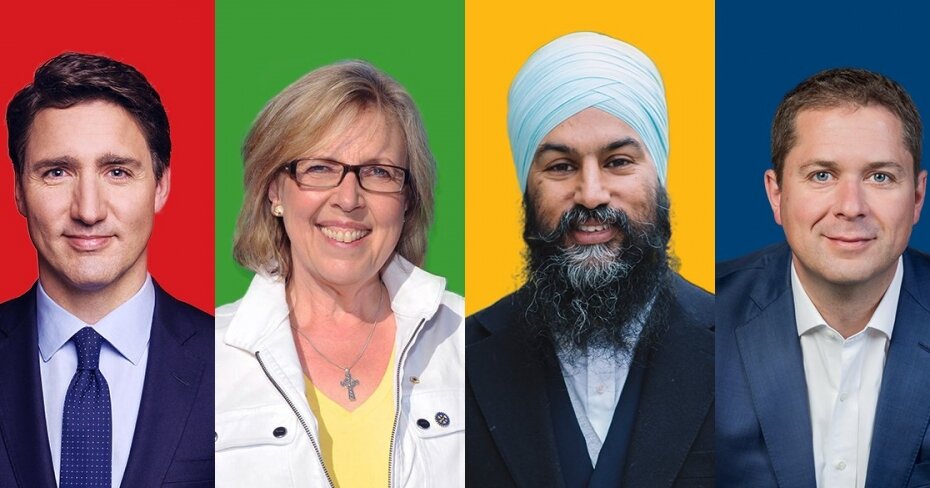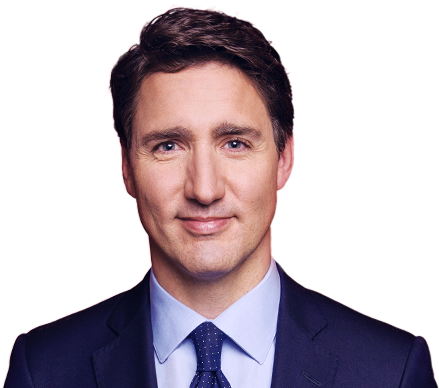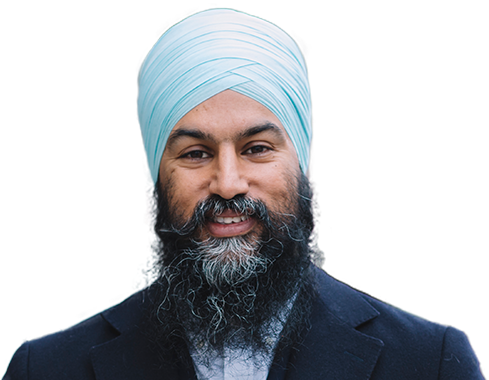Election 2019: Where do Canada's parties stand on financial issues?
By: LowestRates.ca Staff on October 17, 2019
With just days to go until the federal election, you might find yourself undecided on who to vote for.
That's alright. We're here to help. As a website focused on personal finance, we want to demystify money for Canadians. That means informing you about the various promises being made by the politicians running to be Prime Minister.
Below we list the four major federal candidates and what their financial policies are. This list covers the major parts of their platforms, such as housing, taxes and investing.
We hope you'll use this resource to inform yourself about the key financial issues that matter to you. And remember, don't forget to get out there and vote on Oct. 21.
Liberals

Mortgages: Justin Trudeau plans to expand the $1.25-billion First Time Home Buyers Incentive (FTHBI), which his party introduced in its 2019 budget and provides first-time buyers up to 10% off the purchase price of their first home, in exchange for an equity stake. Trudeau wants to up the FTHBI in Greater Vancouver, Victoria, and the GTA to include homes worth up to $789,000 (formerly the cap was at $480,000). The Liberal party increased the RRSP withdrawal limit from $25,000 to $35,000, but has cited no plans to ease the rules of the mortgage stress test.
Housing: Trudeau has pledged to bring in a 1% housing speculation tax on foreign-owned homes in Canada. He’s also promising roughly 1.5 million Canadian households access to up to $40,000 in interest-free loans for retrofitting their homes with more energy-efficient features, such as upgrading or replacing old furnaces and leaky windows, as well as implementing features that make homes more resilient against flooding and wildfires.
Insurance: On the health file, the Liberals have promised to kickstart discussions with the provinces about instituting national pharmcare. The Liberals are the only party to announce a national plan to tackle mounting home insurance costs. Trudeau says he’d introduce low-cost national flood insurance, which would be delivered via the Canada Mortgage and Housing Corporation, as well as $150-million to complete flood mapping nationwide. He’d also create a new employment-insurance disaster-benefit program by 2021.
Taxes: Under Trudeau’s plan, low and middle income earners won’t pay income tax on the first $15,000 of their earnings. Like the Tories, the Liberals have also pledged to make maternity and paternity benefits tax free. The Liberals have also promised to double the Child Disability Benefit, which would give families of children with disabilities up to $5,664 in financial support.
Investing and everything else: The Liberals say give startups money to help them grow, pledging cash incentives if they're elected. The party has also said that it'll look into elminating so-called swipe fees that merchants have to pay to credit card companies.
Conservatives

Mortgages: Andrew Scheer has promised to bring back a longer amortization period of 30 years instead of the current 25 in order to help lower first-time homebuyers’ monthly mortgage payments. He’s also pledged to ease the requirements of the mortgage stress test, though it remains unclear to what extent, and has said he’d like to eliminate the mortgage stress test completely when homeowners go to renew their mortgages.
Housing: Scheer has promised a 20% refundable tax credit to homeowners who make energy-saving renovations to their homes. The tax credit could be worth up to an annual $3,800. Scheer also plans to launch an inquiry into the alleged money laundering that some say is happening in Canadian real estate as part of an effort to find out what’s inflating house prices. He’s also said he plans to open up surplus federal real estate to development so that it can be turned into available housing supply.
Insurance: Scheer said that he would maintain and increase long-term health care payments from the federal government. As for universal pharmacare, Scheer hasn’t addressed the topic head-on. He has, however, promised to lower taxes and introduce more tax credits, indicating that, if elected, the Conservatives would expect individuals to manage their own medical costs. The Conservatives have not made any announcements in terms of home insurance for areas affected by climate change.
Taxes: Scheer has promised the removal of federal income tax from maternity and parental benefits by introducing a 15% tax credit for income earned under both programs. Scheer has also pledged to bring back the public transit tax credit and cancel the Liberal carbon tax. Scheer has pledged to increase the old age tax credit by $1,000 and has promised to make it easier for Canadians to access the disability tax credit. The Tories have promised to cut the tax rate on the lowest income bracket (about $47,000) from 15% to 13.75% and have also promised a child fitness tax credit and a children’s art and learning credit.
Investing and everything else: The Conservatives plan to increase the federal government's contribution to Registered Education Savings Plans (RESPs) from 20% to 30% for every dollar invested, maxing out at $2,500 a year. As well, the lifetime maximum of grants paid out by the government would increase from $7,200 to $12,000.
NDP

Mortgages: Jagmeet Singh also plans to bring back 30-year amortization terms for first-time buyers on mortgages that are insured through Canada Mortgage Housing Corporation (CMHC). He’s also asked the housing crown corporation to consider supporting co-ownership mortgages, where homebuyers can buy with family or friends to ease costs. Singh has indicated he also wants to double the first-time home buyers tax credit to $1,500.
Housing: Singh plans to spend $5 billion on new affordable housing within his first year-and-a-half in office. He plans to build 500,000 affordable homes in the next 10 years, which includes investing in co-op housing units and non-market affordable housing. He’s also pledged to waive federal GST/HST on new construction projects that have a significant amount of affordable housing units, in order to help get them built faster. Singh’s platform also includes providing an immediate $5,000 subsidy to nearly 500,000 families who are struggling to pay their rents, and creating a public ownership registry to combat real estate money laundering.
Insurance: The NDP say that by 2020, they’ll deliver a national pharmacare program that provides comprehensive coverage. Dental care will be covered under medicare, though it will only be available to households making less than $70,000 per year starting in 2020.
Taxes: Singh has promised higher taxes on the wealthy to pay for a wide range of policies, including pharmacare, affordable housing, etc. An NDP government would also provide cash incentives to encourage people to buy zero-emission vehicles. Singh’s tax plan also focuses on the private sector. The NDP have promised to roll back corporate income tax cuts by three percentage points to 2010 levels. In addition, capital gains inclusion will be increased to 75% and a wealth tax on top earners will be introduced.
Investing and everything else: While not an official part of their platform, the NDP has talked about closing a stock-option loophole and potentially getting rid of the use of bearer shares and foreign tax havens, which the party says allows the rich to hide money from being taxed.
Green

Mortgages: Elizabeth May has said she wants to eliminate the first-time home buyers grant, claiming it’s made housing speculation and commodification worse. She has also pledged to rejig the mandate of CMHC so that it includes supporting the development of affordable housing. She wants to change the law that prevents Indigenous organizations from receiving financing from CMHC for self-determined housing needs, and she also wants to eliminate the Liberals’ first-time home buyers tax credit.
Housing: May wants to make housing a “fundamental human right” for all Canadians and permanent residents. She also wants to appoint a Minister of Housing as a means to strengthen the National Housing Strategy, and address the housing needs unique to each province. She wants to build 25,000 new and 15,000 rehabilitated units every year for the next decade and increase the Canada Housing Benefit by $750 million for rent assistance for 125,000 households with rent. The Greens pledge to bring back tax incentives for purpose-built rental housing and provide tax credits for land turned into affordable housing.
Insurance: The Greens will include pharmacare under medicare as well as free dental care for low-income Canadians.
Taxes: May has promised to close the capital gains loophole and tax financial transactions at 0.5%. She’s also pledged to introduce a tax on wealth above $20 million and implement a “robot tax” on companies that replace workers with machines. In addition, the Greens have promised to implement a tax on “sugary drinks.”
Investing and everything else: The Green Party is proposing big policies that could significantly lower debt burdens and costs for a variety of people. Their platform includes federal student loan forgiveness, free post-secondary education and as mentioned, universal pharmacare.

.jpg?itok=SnQQgxS0)
